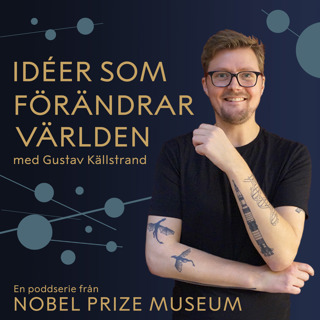
Inside the Battle for Psychedelic Therapy | Rick Doblin
What does it take to turn a banned psychedelic into an FDA-approved medicine?Visit MAPS to read about the latest progress is psychedelic research: https://maps.org/In this episode, we speak with Rick Doblin, founder of the Multidisciplinary Association for Psychedelic Studies (MAPS), about the decades-long mission to make MDMA-assisted therapy a legal treatment for PTSD and other mental health conditions. Rick received his PhD from Harvard's Kennedy School of Government in public policy focusing on the regulation of medical use of psychedelics in 2001. Rick shares the science behind MDMA’s therapeutic effects, the strategy for winning over regulators, and the battles over claims of neurotoxicity. We discuss the history of psychedelic research, the rise of the underground therapy movement, and how clinical trials, policy change, and cultural perception must align to move psychedelics from stigma to science.Whether you’re curious about psychedelic science, drug policy reform, FDA clinical trials, or the future of mental health treatment, this conversation delivers expert insight into the intersection of research, regulation, and real-world impact.Follow us for more technical interviews with the world’s greatest scientists:Twitter: https://x.com/632nmPodcastInstagram: https://www.instagram.com/632nmpodcast?utm_source=ig_web_button_share_sheet&igsh=ZDNlZDc0MzIxNw==LinkedIn: https://www.linkedin.com/company/632nm/about/Substack: https://632nmpodcast.substack.com/Follow our hosts!Michael Dubrovsky: https://x.com/MikeDubrovskyMisha Shalaginov: https://x.com/MYShalaginovXinghui Yin: https://x.com/XinghuiYinSubscribe:Apple Podcasts: https://podcasts.apple.com/us/podcast/632nm/id1751170269Spotify: https://open.spotify.com/show/4aVH9vT5qp5UUUvQ6Uf6ORWebsite: [https://www.632nm.com](https://www.632nm.com/)Timestamps:00:00 - Intro01:32 - How Would Rick Describe a Psychedelic Experience?05:02 - What is Rick's Favorite Psychedelic?09:46 - The Underground is Ahead of the Research12:45 - How Rick Got Interested in Psychedelics26:39 - Can Psychedelics Stop War?40:45 - Do People Need Trauma?45:09 - Is America a Falling Empire?52:08 - What if MAPS was in the YC?55:00 - Why was MDMA the Choice to Push for Legality?1:02:22 - The Origins of Modern Psychedelic Therapy1:05:20 - Misinformation Around Psychedelics1:17:12 - How MAPS is Developing Psychedelic Therapies1:30:13 - How Should Healthy People Use Psychedelics?1:38:05 - Psychedelic Experiences as Rites of Passage1:42:02 - Finding Life's Purpose1:52:49 - Why Do Fears of Psychedelics Persist?1:56:44 - What Does It Take for Psychedelics to Get FDA Approved?2:13:55 - Rick's Pet Wolf2:23:39 - Rick's Last Interaction with his Wolf2:30:55 - Psychedelic Group Therapy2:33:37 - We Need More Psychedelic Therapists
26 Aug 2h 38min

Biology's Biggest Chicken and Egg Problem | Jacob Fine
Life’s First Blueprint Wasn’t DNA; it was RNA.Read Jacob Fine’s latest publication here: https://www.sciencedirect.com/science/article/pii/S0022283625001901Today we spoke with Jacob Fine, graduate student researcher in Computational Biology from the University of Toronto. We explore the physics of replication, the role of entropy and information theory, and how modern biology is reconnecting with theory to understand the most fundamental question in science. Our conversation takes place in a Russian sauna, where the hot and humid environment mimics some of the conditions needed for life to begin.Follow us for more technical interviews with the world’s greatest scientists:Twitter: https://x.com/632nmPodcastInstagram: https://www.instagram.com/632nmpodcast?utm_source=ig_web_button_share_sheet&igsh=ZDNlZDc0MzIxNw==LinkedIn: https://www.linkedin.com/company/632nm/about/Substack: https://632nmpodcast.substack.com/Follow our hosts!Michael Dubrovsky: https://x.com/MikeDubrovskyMisha Shalaginov: https://x.com/MYShalaginovXinghui Yin: https://x.com/XinghuiYinSubscribe:Apple Podcasts: https://podcasts.apple.com/us/podcast/632nm/id1751170269Spotify: https://open.spotify.com/show/4aVH9vT5qp5UUUvQ6Uf6ORWebsite: https://www.632nm.comTimestamps:00:00 - Intro01:22 - What does any theory of the origin of life need to explain?04:09 - When did people begin researching the origin of life?06:51 - Competing theories of the origin of life11:00 - The RNA world hypothesis21:38 - Biological vs computational error24:58 - Origin of life is the origin of information33:30 - Without error, there would be no life36:07 - Early compartmentalization mechanisms47:26 - What do we need to prove theories on the origin of life?57:23 - What makes a useful model for biology?1:04:44 - What inspired Jacob to investigate the origin of life?1:09:45 - Jacob's favorite theories for the origin of life1:11:58 - Do we need a Manhattan project to discover the origin of life?1:18:49 - What are the next steps for origins of life research?1:24:06 - Has exposure to religion shaped Jacob’s perspective on science?
12 Aug 1h 31min

The Final Interview with MIT Physicist Keith Johnson
One of Keith Johnson’s final interviews: a brilliant mind on dark matter, water, and fusion.Read about Keith’s legacy here: https://news.mit.edu/2025/keith-johnson-materials-scientist-independent-filmmaker-dies-0723This episode is one of the final recorded conversations with MIT physicist Keith Johnson, who passed away just weeks after our interview. In this conversation, he unpacks his early research on the quantum structure of matter, his cold fusion theories, and how it all led to a screenplay about a young female physicist. Johnson also suggests a radical idea: water clusters in space might explain some aspects of dark matter. A one-of-a-kind interview that blends science, art, and speculation.We’re honored to share this glimpse into Keith’s remarkable intellect, creativity, and curiosity. May his legacy continue to inspire.Follow us for more technical interviews with the world’s greatest scientists:Twitter: https://x.com/632nmPodcastInstagram: https://www.instagram.com/632nmpodcast?utm_source=ig_web_button_share_sheet&igsh=ZDNlZDc0MzIxNw==LinkedIn: https://www.linkedin.com/company/632nm/about/Substack: https://632nmpodcast.substack.com/Follow our hosts!Michael Dubrovsky: https://x.com/MikeDubrovskyMisha Shalaginov: https://x.com/MYShalaginovXinghui Yin: https://x.com/XinghuiYinSubscribe:Apple Podcasts: https://podcasts.apple.com/us/podcast/632nm/id1751170269Spotify: https://open.spotify.com/show/4aVH9vT5qp5UUUvQ6Uf6ORWebsite: https://www.632nm.comTimestamps:00:00 - Intro01:03- Early Life and Education03:27 - Graduate Studies and Research Funding05:44 - Postdoctoral Work and Quantum Chemistry09:45 - Starting at MIT and Collaborations15:05 - Cold Fusion and Film Making23:38 - Keith's First Screenplay28:55 - Filming a Movie at MIT43:50 - Water Clusters and Quantum Energy53:54 - Is Cold Fusion Possible?1:07:13 - Challenges in Fusion Energy1:12:09 - Advice for Young ScientistsAPPENDIX:1:15:42 - Water Might Be Connected to Dark Matter1:24:49 - Cosmic Dust and Supernovae1:28:36 - The Role of Water in the Universe1:38:32 - The Future of Dark Matter Research1:51:27 - Water Might Have Been Created Sooner After the Big Bang#KeithJohnson #MIT #ScienceAndStorytelling #QuantumPhysics #DarkMatter #Astrobiology #BreakingSymmetry
5 Aug 2h 15min

How We Build Telescopes to Explore the Early Cosmos | Brian Keating
Did the Big Bang really happen? Telescopes, dark matter & cosmic origins explored.Join cosmologist Brian Keating as we explore the mysteries of the universe, from building telescopes at the South Pole to measuring the polarization of the cosmic microwave background and chasing signs of gravitational waves. We discuss Galileo’s influence, cosmic inflation, and how the Nobel Prize could be changed to better reflect the way we do science. Follow us for more technical interviews with the world’s greatest scientists:Twitter: https://x.com/632nmPodcastInstagram: https://www.instagram.com/632nmpodcast?utm_source=ig_web_button_share_sheet&igsh=ZDNlZDc0MzIxNw==LinkedIn: https://www.linkedin.com/company/632nm/about/Substack: https://632nmpodcast.substack.com/Michael Dubrovsky: https://x.com/MikeDubrovskyMisha Shalaginov: https://x.com/MYShalaginovXinghui Yin: https://x.com/XinghuiYinSubscribe:Apple Podcasts: https://podcasts.apple.com/us/podcast/632nm/id1751170269Spotify: https://open.spotify.com/show/4aVH9vT5qp5UUUvQ6Uf6ORWebsite: https://www.632nm.com
29 Juli 1h 43min

Quantum Complexity: Scott Aaronson on P vs NP and the Future
In this episode of the 632nm podcast, Scott Aaronson shares his early fascination with calculus at age 11 and how “rediscovering” old mathematics led him toward groundbreaking work in complexity theory. He gives a lucid explanation of P vs NP, revealing how seemingly trivial questions about verifying solutions speak to some of the deepest unsolved problems in all of computing.Aaronson also explores the frontiers of quantum computing, from the nuances of quantum supremacy experiments to the idea of quantum money and certified randomness. He explains how amplitudes—rather than straightforward probabilities—unlock powerful interference effects, yet still face limits imposed by measurement. The conversation concludes with a look at the future of fault-tolerant quantum computers and the possibility that we’ve finally reached the ultimate horizon of computability—unless nature has even stranger surprises in store.02:01 Early Fascination with Mathematics05:10 Exploring Complexity Theory09:10 Understanding P vs NP22:38 The Significance of P vs NP in Cryptography and AI35:04 Mapping Problems and NP Completeness38:37 Quantum Computing and BQP41:41 Shor's Algorithm and Cryptography45:39 Simulating Quantum Systems52:04 Digital vs Analog Quantum Computers58:18 Grover's Algorithm and Quantum Speedup01:02:04 Challenges in Quantum Algorithm Development01:06:41 Beam Splitter Networks and Quantum Sampling01:15:22 Quantum Computing and Information Storage01:17:24 Shor's Algorithm and Factoring Numbers01:20:56 Google's Quantum Supremacy Demonstration01:49:19 Quantum Money and Unclonable Cash01:57:15 The Future of Quantum ComputingFollow us:Twitter: https://x.com/632nmPodcastSubstack: https://632nmpodcast.substack.com/Michael Dubrovsky: https://x.com/MikeDubrovskyMisha Shalaginov: https://x.com/MYShalaginovXinghui Yin: https://x.com/XinghuiYinSubscribe:Apple Podcasts: https://podcasts.apple.com/us/podcast/632nm/id1751170269Spotify: https://open.spotify.com/show/4aVH9vT5qp5UUUvQ6Uf6ORWebsite: https://www.632nm.com
15 Juli 2h 1min

Science Memes, Epigenetic Inheritance, and Rethinking Peer Review
In this episode of the 632nm podcast, we explore cutting-edge ideas in epigenetics and academic publishing. Oded Rechavi reveals how C. elegans worms defy conventional genetics by passing on traits through small RNAs, and discusses how these mechanisms might reshape our understanding of heredity. We also hear about a remarkable experiment hijacking Toxoplasma gondii—the so-called “cat parasite”—to deliver proteins into the brain, opening possible routes for new therapies.Beyond the lab, we explore problems with modern publishing, from glacial review timelines to flawed incentives that push quantity over quality. Learn how AI-driven solutions might speed up peer review, allow scientists to focus on what truly matters, and help keep the spark of curiosity alive.02:33 The Journey of Memeing on Twitter 06:50 Frustrations with Scientific Publishing 13:36 AI in Scientific Reviews 23:57 The Joys and Challenges of Academia 28:25 The Dead Sea Scrolls Project 45:15 Exploring Epigenetic Processes 47:16 Advantages of C. Elegans in Research 51:45 Transgenerational Epigenetic Inheritance 57:07 Challenges in Human Epigenetic Research 01:08:58 Model Organisms in Scientific Research 01:14:50 Innovative Brain Parasite Research 01:22:11 The State of Academic Science 01:29:19 Balancing Science and Life in Israel 01:32:00 Improving the Scientific SystemFollow us:Twitter: https://x.com/632nmPodcastSubstack: https://632nmpodcast.substack.com/Michael Dubrovsky: https://x.com/MikeDubrovskyMisha Shalaginov: https://x.com/MYShalaginovXinghui Yin: https://x.com/XinghuiYinSubscribe:Apple Podcasts: https://podcasts.apple.com/us/podcast/632nm/id1751170269Spotify: https://open.spotify.com/show/4aVH9vT5qp5UUUvQ6Uf6ORWebsite: https://www.632nm.com
24 Juni 1h 33min

Quantum Diamond Sensing: The Surprising Power of NV Centers
In this episode of the 632nm podcast, we explore how diamond-based nitrogen vacancy (NV) centers went from being a curiosity in gemstone physics to a transformative tool for precision magnetometry. You’ll hear how these tiny defects enable room-temperature quantum sensing, providing ultra-high spatial resolution and remarkable resilience in extreme conditions—from planetary research unlocking secrets of our solar system’s earliest days to potential biomedical diagnostics. Our guest recounts the serendipitous connections, engineering challenges, and surprising scientific discoveries along the way.We also discuss how interdisciplinary collaborations spark new ideas, how startups and academia differ in their pursuit of quantum breakthroughs, and why community-driven science can accelerate major scientific leaps.00:42 The Fascination with Diamonds and NV Centers02:58 Early Research and Collaborations10:21 Breakthroughs and Applications in Science50:48 Advancements in Magnetic Imaging51:59 Commercial Applications of Quantum Diamond Microscopes01:02:16 Challenges in Translating Research to Products01:11:11 Future Prospects and Innovations01:36:46 Exploring Quantum Systems and Defects01:39:03 The Harvard Quantum Community01:44:53 Precision Measurement and Quantum Applications01:54:28 Advice for Aspiring Scientists*Follow us:*Twitter: https://x.com/632nmPodcastSubstack: https://632nmpodcast.substack.com/Michael Dubrovsky: https://x.com/MikeDubrovskyMisha Shalaginov: https://x.com/MYShalaginovXinghui Yin: https://x.com/XinghuiYin*Subscribe:*Apple Podcasts: https://podcasts.apple.com/us/podcast/632nm/id1751170269Spotify: https://open.spotify.com/show/4aVH9vT5qp5UUUvQ6Uf6ORWebsite: https://www.632nm.com
6 Juni 2h 21min

Origin of Life, Thermodynamics, and God: Jeremy England
In this episode, Jeremy England reframes the origin of life debate by applying non-equilibrium physics, challenging the notion that life’s emergence must be purely biological or chemical. He describes how matter can “learn” from its environment, drawing on examples from spin glasses, protein folding, and resonating mechanical systems.England also shares how his deep engagement with religious texts—and his unexpected cameo as “the next Darwin” in popular media—shaped his understanding of science and spirituality. From his ordination as a rabbi to his groundbreaking thermodynamic research, England offers a unique perspective on the interplay between faith, scientific inquiry, and the age-old search for meaning.Chapters: 02:59 Jeremy's Journey into Biophysics 08:46 Non-Equilibrium Thermodynamics 35:30 Dissipative Adaptation and Evolutionary Principles 44:34 The Evolution of Energy Consumption 51:35 Thermodynamics in Microbiomes and Ecology 57:18 Protein Folding and Cellular Computation 01:01:43 Origins of Life and Prebiotic Scenarios 01:26:02 Exploring Thermodynamic Constraints on Aging 01:31:48 Science, Religion, and the Infinite Regress 01:36:04 Jewish Law and Modern Materials 01:39:47 Torah's Approach to Existence 02:01:56 Moses' Signs and Worldview 02:09:03 Balancing Practicality and Spirituality 02:14:02 Advice for Aspiring ScientistsMore About Jeremy:Twitter: Jeremy England (@lifelikephysics) / XBook: https://www.amazon.com/Every-Life-Fire-Thermodynamics-Explains/dp/1541699017Follow us:Twitter: https://x.com/632nmPodcastSubstack: https://632nmpodcast.substack.com/Michael Dubrovsky: https://x.com/MikeDubrovskyMisha Shalaginov: https://x.com/MYShalaginovXinghui Yin: https://x.com/XinghuiYinSubscribe:Apple Podcasts: https://podcasts.apple.com/us/podcast/632nm/id1751170269Spotify: https://open.spotify.com/show/4aVH9vT5qp5UUUvQ6Uf6ORWebsite: https://www.632nm.com
19 Maj 2h 19min




















